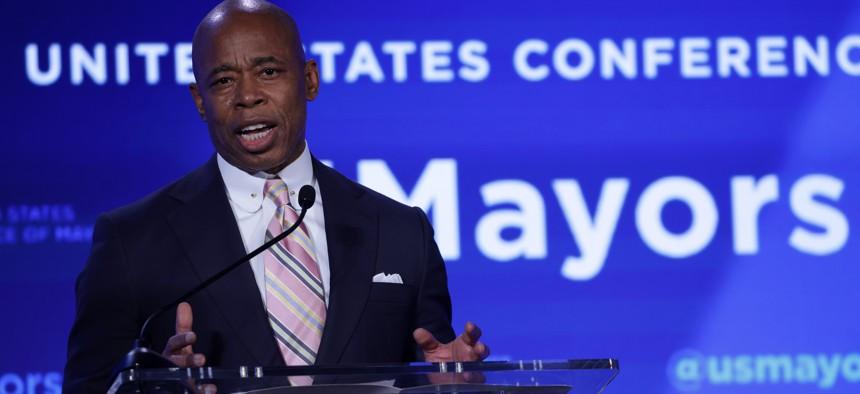Mayor Adams’ Veto on Street Vending Decriminalization Sparks Intense Debate
In a controversial move that has ignited widespread discussion, Mayor Adams has exercised his veto power against a recently approved bill designed to decriminalize street vending throughout the city. The legislation aimed to grant legal protections and formal recognition to street vendors, a group often seen as vital contributors to the local economy and cultural fabric. Advocates praised the bill as a crucial step toward empowering small entrepreneurs and reducing economic inequality. However, the mayor’s rejection highlights the persistent challenges in balancing urban regulation with the realities of informal commerce. This article delves into the ramifications of this decision and the diverse responses from community members and stakeholders.
Community Backlash and Support for Street Vendor Legalization
Despite strong backing from street vendors, advocacy organizations, and neighborhood leaders, Mayor Adams vetoed the bill that would have legalized street vending citywide. Proponents argued that the legislation would offer essential safeguards, lower penalties, and open economic pathways for thousands of informal workers who rely on vending for their livelihoods. Yet, city officials expressed apprehensions about the bill’s ability to effectively regulate vending activities, citing concerns over public safety, sanitation, and the impact on local neighborhoods.
- Insufficient enforcement provisions within the bill
- Potential disruption to pedestrian flow and local businesses
- Calls for a more holistic strategy incorporating community feedback and infrastructure improvements
| Group | Stance | Main Concerns |
|---|---|---|
| Street Vendors | In Favor | Legal safeguards, economic opportunity |
| Local Retailers | Opposed | Competition, obstruction of sidewalks |
| City Council Members | Divided | Regulatory enforcement, urban planning |
Public Safety and Economic Concerns Underpinning the Veto
Mayor Adams emphasized significant public safety issues linked to unregulated street vending, especially in densely populated urban zones. Law enforcement and traffic authorities have reported that unauthorized vending can block sidewalks and streets, posing risks to pedestrians and vehicles. The administration warned that without a robust regulatory framework, congestion and illegal setups could worsen, threatening emergency access and overall community safety.
From an economic perspective, the veto reflects worries about the potential negative effects on established businesses. Many small business owners contend that decriminalizing street vending without stringent oversight could undercut licensed merchants and diminish city tax revenues. Opponents highlighted several key issues:
- Possible revenue loss for brick-and-mortar establishments
- Noncompliance with tax obligations by informal vendors
- Difficulty ensuring product quality and consumer protection
| Area of Impact | Specific Concerns |
|---|---|
| Safety | Sidewalk blockages, hindered emergency routes |
| Economy | Competition with licensed businesses, tax revenue loss |
| Regulation | Enforcement difficulties, product safety issues |
Advocates Call for Inclusive and Practical Regulatory Alternatives
In response to the veto, community advocates and vendor representatives have urged city leaders to reconsider and develop more inclusive policies that protect vendors’ livelihoods while addressing safety and sanitation concerns. They argue that criminalizing street vending forces many entrepreneurs into unstable conditions, often resulting in fines or arrests rather than sustainable economic growth. Instead, they propose collaborative regulatory models that incorporate stakeholder input, simplify licensing, and designate specific vending zones to harmonize commerce with urban order.
- Adoption of a tiered permit system based on vendor size and type
- Formation of community oversight committees to monitor vending activities
- Introduction of micro-grant programs to assist vendors in compliance and expansion
- Public awareness campaigns to promote mutual respect between vendors and residents
| Proposed Initiative | Expected Benefits | Current Status |
|---|---|---|
| Tiered Permitting | Cost-effective, adaptable | Under Consideration |
| Community Oversight | Enhanced accountability | Drafted |
| Micro-Grants | Economic empowerment | Proposed |
| Public Education | Improved social harmony | Planned |
Encouraging Collaborative Policy Development for Sustainable Street Vending
Following the mayor’s veto, experts and community leaders recommend that city officials engage a broad spectrum of stakeholders—including vendors, residents, and business owners—to co-create balanced policies. Such inclusive dialogue can help address misconceptions and develop regulations that reflect the complex realities of street vending. Proactive engagement is seen as essential to crafting solutions that uphold public safety, foster economic inclusion, and maintain neighborhood quality of life.
- Providing affordable permits and designated vending areas for vendors
- Balancing public health and pedestrian accessibility without excessive penalties
- Encouraging partnerships between vendors and community organizations
- Launching pilot programs to test adaptive regulations based on feedback
| Stakeholder | Primary Concern | Role in Policy Formation |
|---|---|---|
| Street Vendors | Legal protection and income stability | Shaping practical regulations and permit systems |
| Residents | Neighborhood safety and cleanliness | Offering feedback on local impacts and enforcement |
| Local Businesses | Fair competition and customer experience | Collaborating on inclusive economic policies |
Conclusion: Navigating the Complexities of Street Vending Policy
Mayor Adams’ veto of the street vending decriminalization bill underscores the ongoing struggle to reconcile regulatory frameworks with the needs of informal workers. As advocates continue to press for legislative reforms, the city faces a critical juncture in balancing public order, safety, and economic opportunity. This decision sets the stage for continued dialogue, innovative policy proposals, and potential legal challenges in the near future, reflecting the evolving dynamics of urban commerce and community development.













